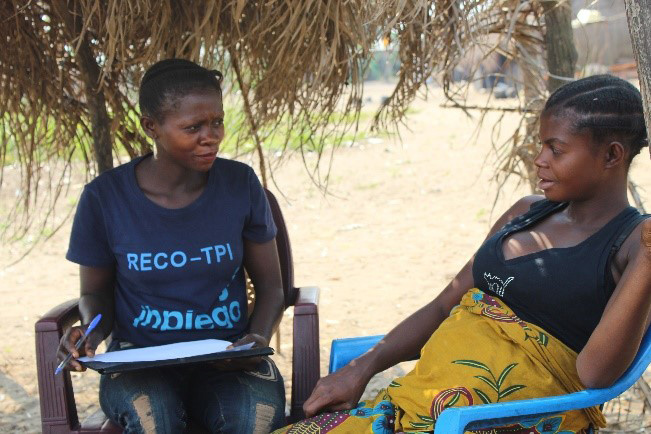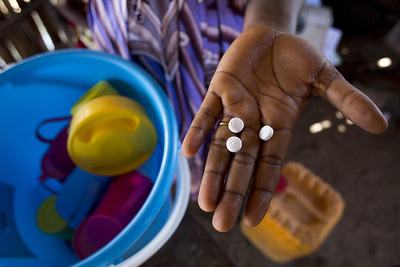
Kenge, Democratic Republic of the Congo—In rural Makiala village in southwestern Democratic Republic of the Congo (DRC), young mothers often lived alone or with their grandmothers while their husbands or partners left to seek work in the city. Pregnant women preferred to give birth at home or elsewhere due to a lack of medical supplies and quality care at the health facility, but many died or gave birth to stillborn babies as a result of a lack of medical attention. These deaths created a climate of fear and distrust.
Nevertheless, one courageous woman is working to break this reality and perception—Madeleine Kiese Vuandu, a community health worker and mother of four. Vuandu provides counseling, education and information to residents in Makiala. As a community health worker, she visits households and talks with pregnant women and their families about malaria prevention, the importance of antenatal care and hygiene. She does so with passion and joy.
In 2019, Vuandu expanded her mission after she attended an advocacy meeting on maternal health held by Jhpiego as part of the Transforming Intermittent Preventive Treatment for Optimal Pregnancy (TIPTOP) project. Due to her previous work supporting pregnant women in her village, Vuandu was selected by her community to be trained and supported through the TIPTOP project to provide quality malaria prevention services to pregnant women. The project used an innovative community-based approach to distribute an antimalarial treatment—sulfadoxine-pyrimethamine—to eligible pregnant women. Vuandu accepted this new role, realizing the project’s goals aligned with her community work and being keen to continue helping pregnant women in her village.
Malaria is the main cause of illness and death in the DRC. It is especially dangerous for pregnant women because pregnancy reduces women’s immunity to malaria, which increases the risk of severe anemia, miscarriage, premature delivery, stillbirth and even death. However, the use of a safe, effective and affordable antimalaria treatment, referred to as intermittent preventive treatment in pregnancy with sulfadoxine-pyrimethamine, or IPTp for short, reduces these risks.
“It is true that a community health worker is a bridge. I just realized it through this mission of the TIPTOP project for my community. Just communicate and things change!”
Madeleine Kiese Vuandu
The TIPTOP project, led by Jhpiego and funded by Unitaid, worked through a network of community health workers like Vuandu to deliver IPTp in districts in the DRC, Madagascar, Mozambique and Nigeria. IPTp is usually provided during antenatal care visits, but the percentage of women who take a full course of treatment is well below the global targets due to barriers such as lack of access and awareness around malaria in pregnancy. TIPTOP piloted a community-based approach to deliver IPTp to eligible pregnant women where they live and encourage antenatal care attendance.

“Many projects came to the village but they did not involve us. So, we didn’t understand anything. The TIPTOP project, through Jhpiego, came to work with us and to save lives,” Vuandu says. “I am impressed by their approach and work. I told myself that I have to join them in preventing malaria during pregnancy and save the lives of mothers and babies—I am a part of this.”
When Vuandu’s village selected her to be their community IPTp leader, she joined TIPTOP’s IPTp community health worker group. In this role, she administers IPTp to pregnant women in the village, starting with the first dose, and refers them to the health facility for antenatal care services. She also conducts household visits, raises awareness about community distribution of IPTp and follows up with pregnant women to complete antenatal care visits.
At the beginning, everything seemed difficult—people didn’t understand why Vuandu prioritized visits to pregnant women. But with her courage and commitment, and support from the community health focal points, Vuandu overcame these obstacles and the community came to trust her. In 2019, all 17 pregnant women who Vuandu identified attended their antenatal care visits at the nearby health facility and gave birth successfully.
Across the life of the TIPTOP project in the DRC, the percentage of pregnant women who received the recommended three doses of IPTp increased from 21 percent at baseline to 65 percent at endline. In addition, the percentage of women who attended four antenatal care visits increased from 40 percent to 49 percent. This last number is particularly striking since TIPTOP set out to prove that community distribution of IPTp would not detract from women attending antenatal care at the health facility; in the case of the DRC, community IPTp actually helped increase antenatal attendance.
The TIPTOP project ended in May 2022, but that didn’t end community IPTp. The project built in a sustainability plan that included income generating activities to support community distribution of IPTp in TIPTOP-supported districts. Now, the engaged community supports and owns this approach because they appreciated the changes TIPTOP brought to pregnant women and their families. Today, in the three TIPTOP project districts in the DRC, community IPTp is integrated into the health system and all community health workers are trained and provided with the tools to carry out community IPTp.
Thanks to Vuandu and other community health workers, more pregnant women from the village are coming to the health facility and keeping their antenatal care appointments. Vuandu’s neighbor Joyce is one of the 61 women who recently gave birth to healthy babies.
“Joyce, my neighbor, gave me joy. I worked with her from the start of her pregnancy—when she received her first dose of IPTp—until she delivered at the Makiala Health Center,” says Vuandu. “Today Joyce and baby are doing well. My joy is to see the fruit of nine months of follow-up and advice turned into lives saved in the whole village community.”
Fabrice Witanday is a communications and advocacy officer in Jhpiego’s office in Kinshasa, DRC.



